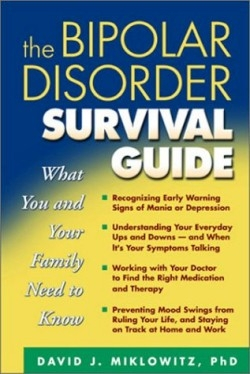
The Bipolar Disorder Survival Guide
What You and Your Family Need to Know
Sometimes a serious disorder can make a person feel better than normal. Those with mania (or its lesser form, hypomania) often don’t want to come down from their high. The author, a psychologist and professor at University of Colorado, has studied and treated patients suffering from the highs and lows—mania and depression—of this perplexing syndrome for twenty years. He demonstrates compassion and thoroughness in this book, which is well organized and highly readable, not only for its obvious target audience, but for anyone interested in a state-of-the-science presentation in clinical psychology (or psychiatry—the relevant branch of medicine).
Miklowitz groups twelve chapters in three sections: the diagnosis and course, causes and treatments, and self-management of what used to be known as manic-depressive illness. He speaks to readers as patients, leading them through the process of recognizing the syndrome; getting help; and understanding medication, psychotherapy, family therapy, and how life circumstances interact with genetic vulnerability. “You can feel extraordinarily pessimistic and hopeless, fatigued, and unable to concentrate,” he explains, “but still feel ‘revved,’ anxious, irritable, driven, and sleep deprived, with your thoughts moving very rapidly.”
Case vignettes enliven the text, while sidebar summaries and charts make it very practical as a reference, self-help guide, and anchoring device. Many patients are vulnerable to schedule fluctuations, so keeping a regular calendar can be important. Stress from work or relationships adds hazards on the road. The author’s tone is encouraging and sensitive while quite direct. He counsels against any use of alcohol or recreational drugs. He confronts suicidal depression on one side, and inappropriate levity on the other.
Medication for this syndrome is effective but not perfect. With lithium, for example, the relapse rate is about one-third, compared with four-fifths on placebo. This is worth emphasizing at a time when some reports suggest that psychotropic medications are little better than placebo. The last chapter, on coping in the family and work settings, addresses reasonable workplace accommodations and disability status. Finally, Miklowitz lists resources—books, organizations, Internet sites. All told, this is a model of sophisticated health education.
Reviewed by
E. James Lieberman
Disclosure: This article is not an endorsement, but a review. The publisher of this book provided free copies of the book to have their book reviewed by a professional reviewer. No fee was paid by the publisher for this review. Foreword Reviews only recommends books that we love. Foreword Magazine, Inc. is disclosing this in accordance with the Federal Trade Commission’s 16 CFR, Part 255.
